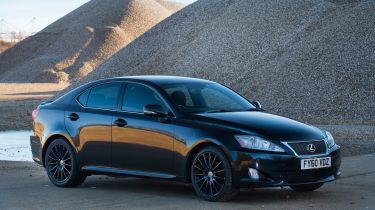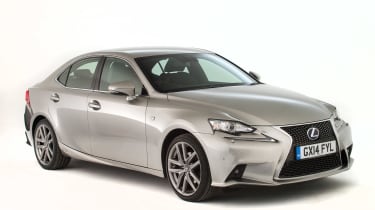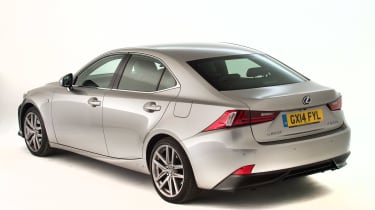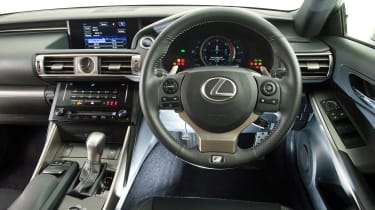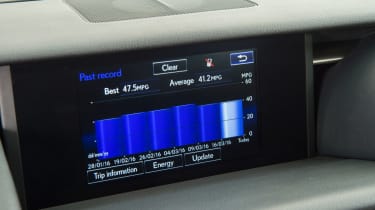Used Lexus IS review
A full used buyer’s guide on the Lexus IS covering the Mk2 IS (2005-2013) and the Mk3 IS (2013-date)
Lexus IS Mk3
History
The first IS Mk3s reached dealers in July 2013. There was a choice of a 2.5-litre V6 petrol IS 250 and an IS 300h, which combined the same engine with an electric motor as part of a hybrid drivetrain and cost an extra £3,000 new. Trim levels were SE, Luxury, F Sport and Premier, with all cars featuring an automatic gearbox; there was no manual option.
By June 2014 there was an IS 300h Executive Edition – based on the Luxury, but cheaper and with standard leather trim and navigation. The IS 250 was replaced by the more efficient IS 200t in November 2015, with a turbocharged 2.0-litre petrol engine and an eight-speed dual-clutch gearbox. At the same time a Sport trim was added to the line-up. In early 2017 a facelifted IS arrives, with more safety kit and a tweaked chassis.
Lexus IS Mk3 reviews
Lexus IS in-depth reviewLexus IS 200t F Sport reviewLexus IS 250 F Sport reviewLexus IS 300h reviewLexus IS F in-depth reviewLexus IS 300h long-term test review
Which one should I buy?
The IS 250 is best avoided as it’s costly to run. The IS 200t is more efficient, but in reality the IS 300h is the only model to go for if your focus is on your bank balance.
Used - available now

2025 BMW
iX
81,249 milesAutomaticElectric
Cash £26,272
2022 BMW
i3
33,096 milesAutomaticElectric
Cash £14,032
2025 Toyota
Yaris Hybrid
26,859 milesAutomaticPetrol1.5L
Cash £14,935
2022 Volvo
XC40
48,424 milesAutomaticPetrol1.5L
Cash £19,705Lexus is famed for packing its cars with standard kit and the IS is no different. Even the entry-level SE gets xenon lights, self-healing paint, water-repellent glass for the front windows, a seven-inch dash display, multifunction steering wheel and Bluetooth.
Luxury adds a split-folding rear seat, parking sensors and automatic wipers, while the F Sport has 18-inch alloys and sports seats. The Premier has adjustable ventilated seats, a premium multimedia system and blind spot detection.
Alternatives to the Lexus IS Mk3
Direct rivals to the IS are few and far between. Indeed there’s only one regular hybrid competitor: the BMW ActiveHybrid3. Launched in 2013, the saloon (there’s no estate edition) is far more expensive than an IS 300h of similar age and mileage, but it’s a very impressive machine.
Go for one of the more obvious compact executive rivals, though, and you can buy a diesel-engined Audi A4, BMW 3 Series or Mercedes C-Class for a lot less. Estate models are available if you need extra space, and you won’t have to settle for an automatic box, either. The same applies to the Volkswagen Passat and Volvo S60/V60.
What to look for:
Rattles
Some owners have had problems with rattles in their IS, usually from one of the front speaker covers or air-con vents. Fixes can prove elusive.
Media system
There’s been a raft of multimedia updates since the IS Mk3’s arrival. It’s worth checking that any potential purchase has the latest software.
Fuel economy
The official fuel consumption figure for the IS 300h is 65.7mpg, with its hybrid powertrain. Most owners can average 45-50mpg.
Bonnet
Hit an animal in an IS and the pop-up bonnet may well deploy. If it does, the whole mechanism has to be replaced at a cost of over £3,000.
Interior
The futuristic design takes some getting used to, but it works well. Build quality is superb, as are the supportive seats, with lots of adjustment. The IS 200t’s boot can stow 480 litres, but the IS 300h cuts this by 30 litres to accommodate its batteries.
Running costs
Uniquely, Lexus has one maintenance schedule for private owners (12 months or 10,000 miles) and another for business users (12 months or 12,500 miles). Services alternate between minor and major, which are priced at £245 and £445 respectively, whether it’s a hybrid model or a conventional petrol-engined edition.
The 60,000-mile check-up is pegged at £645 because of the extra parts that need to be fitted; the one at 100,000 miles is priced at £595. This includes the cost of fresh coolant (required after 100,000 miles then every 50,000 miles), while the brake fluid needs to be replaced every two years.
All Lexus engines are chain-driven so there’s no need for any replacement cambelts at any point.
Recalls
Encouragingly – and perhaps unsurprisingly – the third-generation IS has yet to be the subject of any recalls. The original IS, produced between 1999 and 2005, wasn’t caught up in any campaigns, either.
However, its successor (produced 2005-2013) was recalled six times due to a range of potential problems. Mk2 recalls covered faulty airbags, fuel leaks, problems with windscreen wipers and failure of the brake master cylinder. But Mk3 buyers can focus on the condition and service history of any potential purchase.
Driver Power owner satisfaction
Having debuted at number one in our Driver Power 2015 satisfaction survey, the IS slipped to fourth place this year. Second for reliability is impressive, as are third for ease of driving and sixth for build quality. Its lowest scores this year were 91st for practicality and 45th for running costs.
Verdict
A narrow model range is one of the key reasons why many buyers shun the IS, but don’t dismiss this sharply styled saloon. Lexus is renowned for its customer service and reliability. Its cars are crammed with standard kit, and it’s ultra-safe too; the IS was one of the safest family cars ever rated when Euro NCAP crash tested it in 2013.

